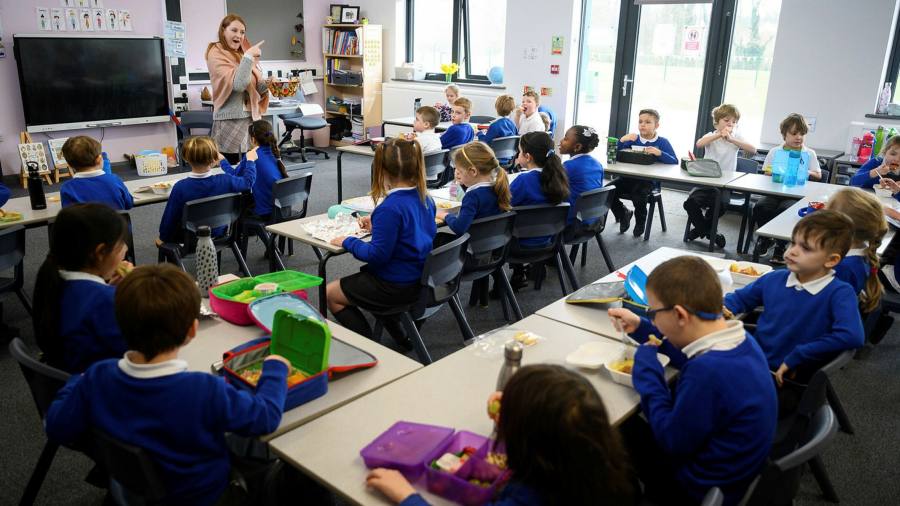[ad_1]
Schools in England are likely to miss out on tens of millions of pounds for their most disadvantaged pupils, after a “discriminatory†government administrative change excluded children pushed on to free school meals during the pandemic in recent months from funding allocations.
Local authorities and education leaders have urged the government this week to reconsider a decision to calculate school funding for the next financial year based on the number of pupils classed as “disadvantaged†in October. The previous formula used January as the cut off.
Charities fear thousands of children pushed into hardship by the pandemic in that three month period will miss out on extra financing to support their learning, as their schools will not receive the much-needed funds for the year to March 2022.
“On a national level, it could mean that schools miss out on tens of millions of pounds of funding,†said Sir Peter Lampl, founder of the Sutton Trust, an education charity. He added that the extra money was all the more crucial as it was needed to help children catch up on lost education due to the coronavirus lockdowns.
Natalie Perera, chief executive of the Education Policy Institute, agreed: “It is concerning that, at a time when disadvantaged children need more support, the government has made a policy decision which would result in these children attracting less funding.â€
Recent data for the number of extra pupils eligible for the funding because they claim free school meals is not yet available. Official January 2020 figures puts the number of children eligible for free school meals in England at 1.54m. A survey by the Food Foundation charity survey in September estimated an extra 900,000 children became eligible in the first six months of the pandemic.
Local education authorities have said recent rises in universal credit claims offer an indication of the large numbers of children potentially affected by the funding shortfall.
The heads of education and children’s services at 16 Labour-run London councils wrote to Gavin Williamson, education secretary, this week, warning him that the changes meant schools would “lose significant funding, which would have helped them support our poorest pupils with their learningâ€.
They urged him to “reconsider this ill-thought through, and discriminatory policy change, an attack on the poorest children in our schools, and revert to the census date of January 2021â€.
It pointed out that across the capital, there were an extra 53,949 claims for UC between October and December and that “many of these families became eligible, and registered, for free school mealsâ€.
Total UC claims in England for that period rose by 3.8 per cent, or 188,665, according to official data. This jumps to 269,015 for the four months to January, an increase of 5.5 per cent.

Local education authorities that have flagged the problem with ministers and those contacted by the Financial Times have given estimates of the shortfall, showing the impact of the administrative date change.
The city of Liverpool has calculated it has lost out on £1.5m and five London boroughs — Barking and Dagenham, Merton, Hounslow, Lewisham and Ealing — estimated a shortfall of more than £3.5m in total. Brighton and Hove council last month pegged the figure at £400,000.
Harris Academies, a chain of 50 schools across the country, said 528 additional pupils had become eligible for so-called “pupil premium funding†between October and January. This would equate to a shortfall of £565,000 in funding, or 5.4 per cent of the total.
“These are very significant sums because the level of poverty has grown significantly,†said Evelyn Carpenter, cabinet member for education at Barking and Dagenham council. “It’s going to have a very severe impact.â€
The funding gap raises fresh questions about the government’s commitment to supporting an increasing number of children being hit by the pandemic. Footballer and poverty campaigner Marcus Rashford forced Boris Johnson, UK prime minister, into two U-turns over free school meal funding last year.
With school budgets under pressure from the additional costs of the pandemic, the loss of the funding will have to be partially offset by the extra catch-up funding made available by central government. The most disadvantaged schools in areas hit hardest by Covid-19 will suffer the biggest hit, education charities warned.
The administrative change affects the financial support that children on free school meals receive for learning, which is paid directly to schools as a “pupil premium†of £1,345 per child at primary school and £995 at secondary.
This year, as in previous years, schools expected the premium to be calculated according to a school census taken in January 2021. But in December, the government quietly decided to allocate premium funding based on an October census instead.
The government said the change meant schools would know their budget earlier and be better able the plan ahead. It said pupil premium would increase to £2.5bn in 2021/22 and said it was “committed to ensuring all children have access to good quality education, no matter their backgroundâ€.
The extra Covid catch-up funding promised to schools is also linked to pupil premium and will be calculated using the October census, the education department confirmed.
Geoff Barton, the general secretary of the Association of School and College Leaders, a union, said it was “perfectly obvious†that the decision would mean schools missed out on funding for children affected by the financial impact of the pandemic.
“At the very least, the government should and still could provide a mechanism to reimburse schools,†he said. “It is well aware that school budgets are very tight, and we urge the government to do the right thing now.â€
[ad_2]
Source link





